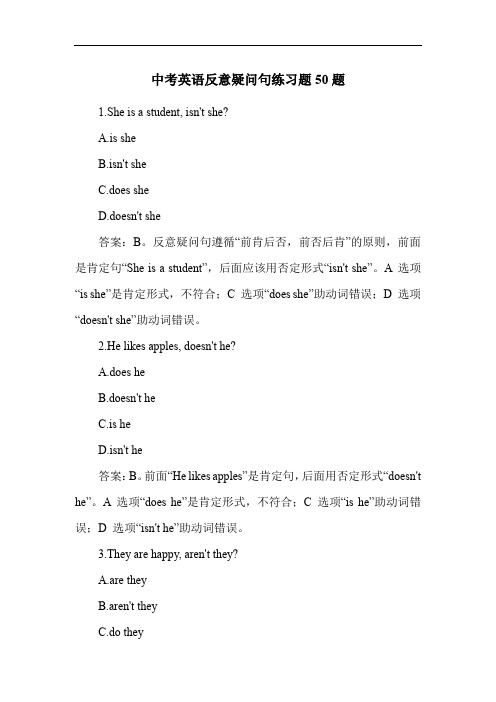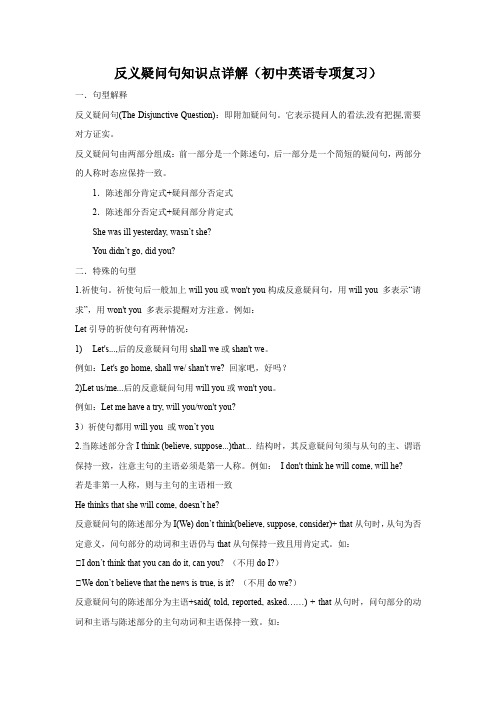中考英语二轮专项复习 反义疑问句
中考英语反意疑问句总复习

反意疑问句精讲及训练(2012.05.16)一、反意疑问句的意义及其构成反意疑问句又叫附加疑问句,是指当提问的人对前面所叙述的事实不敢肯定,而需要向对方加以证实时所提出的问句。
其结构为:前一部分是一个陈述句,后一部分是一个简单的问句。
完成后一部分简单问句时,要根据前面陈述句的动词时态和人称来选择适当的助动词进行提问,前后两部分的人称和动词时态要保持一致。
“前肯后否,前否后肯”。
He is a good boy , isn’t he ? 他是一个好男孩,是吗?陈述句(肯定)简单问句(否定)She wasn’t at home yesterday, was she? 她昨天不在家,是吗?陈述句(否定)简单问句(肯定)They work hard , don’t they? 他们工作很努力,是吗?二、简单句式结构中反意疑问句的运用反意疑问句运用于简单句式结构中时,我们应注意掌握以下几个方面1、当陈述句部分的主语是名词时,反意疑问句的主语必须用人称代词来代替。
例Your brother goes to the library, do esn’t he? 你弟弟去图书馆了,是吗?Lily and Lucy are twin sisters, aren’t they ?莉莉和露西是双胞胎姐妹,是吗?2、当陈述句的主语是指示代词this, that时,反意疑问句的主语用it代替;指示代词是these, those时,反意疑问句的主语用they代替。
例That isn’t a useful book, is it? 那不是一本有用的书,是吗?These are some good students , aren’t they? 这些都是好学生,是吗?陈述部分的主语为不定式、动名词、或从句时,疑问部分的主语用it .Reading in bed is bad for your eyes, isn’t it?3、当陈述句部分是I am…时,反意疑问句部分通常要用aren’t I;如陈述句部分的主语是I am not时,反意疑问句部分通常要用am I。
(通用版)2019中考英语二轮复习感叹句和反义疑问句讲义

8. ________ beautiful car you have bought! A) What B) What a C) What an D) How 9. ________ exciting our life will be in the future with so many wonderful inventions! A) What B) How C)What a D) What an 10. _______honest Tom was to give the mobile phone he found on the bus back to its owner! A) What B) What a C) What an D) How BADCDD B BBD
【句型二】How + 形容词 / 副词 + 主语 + 谓语! How well you look! 你气色真好! How kind you are! 你心肠真好! How beautif ully you sing! 你唱得真好听! Strawberries! How nice! 草莓! 多好呀! How clever the boy is! 这个男孩多么聪明啊! How fast he runs! 他跑得多么快啊! 注意 (1)要修饰名词的形容词不能是表数量的 many, much, little, few,遇此情况要用 how,即使它们后面 跟有名词: How many books he has! 他的书真多! How much money he gave her! 他给了她好多钱呀! How little money I have! 我的钱多么少呀! How few friends he has! 他的朋友真少! 比较:What a little box it is! 多小巧的盒子呀!(该 little 不表示数量)
最新中考英语专项复习 反义疑问句

中考英语专项复习反义疑问句反义疑问句的24个规则使用反意疑问句要注意以下若干对应规则:一、反意疑问句中问句部分的动词与陈述部分的动词在语气上成相反的对应关系,即:肯定+否定?否定+肯定?如:①You can't do it, can you? ②They are very late for the meeting, aren't they?二、反意疑问句中问句部分的动词与陈述部分的动词种类要对应一致。
如:①He has supper at home every day, doesn't he? (不能用hasn't he?)②They have known the matter, haven't they? (不能用don't they?)三、反意疑问句中问句部分的动词在时态上应和陈述部分的时态一致。
如:①They will go to town soon, won't they?(不能用don't they?或aren't they?)②He works very hard, doesn't he?(不能用didn't he?或won't he?)四、反意疑问句的陈述部分含有由un-, im-, in-, dis-, 等否定意义的前缀构成的词语时,陈述部分要视为肯定含义,问句部分用否定形式。
如:①Your father is unhappy, isn't he?(不能用is he?)②The man is dishonest, isn't he? (不能用is he?)③It is impossible to learn English without remembering more words, isn't it?(不能用is it ?)五、反意疑问句的陈述部分带有little, few, never, hardly, seldom等否定意义的词时,问句部分用肯定式。
中考英语反意疑问句练习题50题

中考英语反意疑问句练习题50题1.She is a student, isn't she?A.is sheB.isn't sheC.does sheD.doesn't she答案:B。
反意疑问句遵循“前肯后否,前否后肯”的原则,前面是肯定句“She is a student”,后面应该用否定形式“isn't she”。
A 选项“is she”是肯定形式,不符合;C 选项“does she”助动词错误;D 选项“doesn't she”助动词错误。
2.He likes apples, doesn't he?A.does heB.doesn't heC.is heD.isn't he答案:B。
前面“He likes apples”是肯定句,后面用否定形式“doesn't he”。
A 选项“does he”是肯定形式,不符合;C 选项“is he”助动词错误;D 选项“isn't he”助动词错误。
3.They are happy, aren't they?A.are theyB.aren't theyC.do they答案:B。
“They are happy”是肯定句,后面用否定形式“aren't they”。
A 选项“are they”是肯定形式,不符合;C 选项“do they”助动词错误;D 选项“don't they”助动词错误。
4.She can swim, can't she?A.can sheB.can't sheC.does sheD.doesn't she答案:B。
“She can swim”是肯定句,后面用否定形式“can't she”。
A 选项“can she”是肯定形式,不符合;C 选项“does she”助动词错误;D 选项“doesn't she”助动词错误。
2024年中考英语复习反义疑问句课件

肯定回答和否定回答
1、The girls like listening to popular music,___d_o_n_’t__th_e_y____? 这些女孩喜欢听流行音乐,不是吗? 肯定回答:__Y_e_s,__th_e_y__d_o___.是的,她们喜欢。 否定回答:__N_o_,_t_h_e_y_d_o_n_’t__.不,她们不喜欢。
Somebody phoned while I was out, didn’t they?
Everyone enjoyed the party, didn’t they?
Nobody wants to go there, does he?
3、当陈述部分的主语是不定代词 everything, nothing, anything, something 时,附加 疑问句中的主语一般用it,不用 they。
6. 如果陈述部分用I’m…结构,附加疑问部分 一般用aren’t I 。 I am strong and healthy, aren’t I? 7. 当陈述句为there be结构时,附加疑问句中的主语也用there。
There’s no help for it, is there? There’s something wrong, isn’t there?
10. 当陈述部分带有情态动词must表示“必须 ”时,疑问部分用needn’t。
You must work hard next term, needn’t you? 但:I must answer the letter, must I?
11. 感叹句后的附加疑问句的谓语动词需用be的现在时,且常用否定形式。 What a clever boy, isn’t he? What a lovely day, isn’t it?
反义疑问句知识点详解(初中英语专项复习)1

反义疑问句知识点详解(初中英语专项复习)一.句型解释反义疑问句(The Disjunctive Question):即附加疑问句。
它表示提问人的看法,没有把握,需要对方证实。
反义疑问句由两部分组成:前一部分是一个陈述句,后一部分是一个简短的疑问句,两部分的人称时态应保持一致。
1.陈述部分肯定式+疑问部分否定式2.陈述部分否定式+疑问部分肯定式She was ill yesterday, wasn’t she?You didn’t go, did you?二.特殊的句型1.祈使句。
祈使句后一般加上will you或won't you构成反意疑问句,用will you 多表示“请求”,用won't you 多表示提醒对方注意。
例如:Let引导的祈使句有两种情况:1)Let's...,后的反意疑问句用shall we或shan't we。
例如:Let's go home, shall we/ shan't we? 回家吧,好吗?2)Let us/me...后的反意疑问句用will you或won't you。
例如:Let me have a try, will you/won't you?3)祈使句都用will you 或won’t you2.当陈述部分含I think (believe, suppose...)that... 结构时,其反意疑问句须与从句的主、谓语保持一致,注意主句的主语必须是第一人称。
例如:I don't think he will come, will he?若是非第一人称,则与主句的主语相一致He thinks that she will come, doesn’t he?反意疑问句的陈述部分为I(We) don’t think(believe, suppose, consider)+ that从句时,从句为否定意义,问句部分的动词和主语仍与that从句保持一致且用肯定式。
中考英语复习反意疑问句详细讲义及练习
反意疑问句专项讲义及练习一、基本用法:(一)定义:表示对陈述句所说的事实提出相反的疑问,要求对方用“yes”或“no”来进行回答。
(二)构成:陈述部分+附加疑问句,前一部分是陈述部分,后一部分是附加疑问句(用be 动词/助动词/情态动词+人称代词主格构成,否定式必须是be动词/情态动词/助动词)与not 的缩写形式)。
(三)原则:整个句子遵循前肯定,后否定;前否定,后肯定的原则。
例:He is very old, isn’t he? 他非常老了,不是吗?Tom isn’t working here, is he? Tom不在这里工作,是吗?You like English very much, don’t you? 你非常喜欢英语,对吧?Lucy doesn’t like to stay here, does she? Lucy不喜欢待在这里,是吗?(四)回答:和一般疑问句的回答规则一样(遵循事实即可)例:--Lucy doesn’t like English, does she? Lucy不喜欢英语,是吗?--Yes, she does. 不,她喜欢。
(事实上她是喜欢英语)--No, she doesn’t. 是的,她不喜欢。
(事实上她不喜欢英语)基础练习:1. You are in Grade Two now,______________?2. Your father is a worker, ______________?3. Mary is going to study French, ______________?4. Kate swims very well in her class, ______________?5. They like reading books,______________?6. She isn’t going to buy a book,______________?7. They won’t have a good time,______________?8. We can’t go there together, ______________?9. Tom watches TV every day,______________?10. You don’t like to go there, ______________?二、更多用法(一)当陈述部分是祈使句时,附加疑问句要根据语气来表达,分三种情况:1)一般情况下用will you(或won’t you),其中will you 多表示请求,won’t you则表示提醒对方注意。
(通用版)2019中考英语二轮复习 感叹句和反义疑问句讲义
D. How
2.________ lovely weather we are having for the time of year!
A) What B) What a C) What an D) How
3______ necessary it is to give pilots the best possible training!
A) What
B) What a C) How
D) How a
8. ________ beautiful car you have bought!
A) What B) What a C) What an D) How
9. ________ exciting our life will be in the future with so many wonderful inventions!
但有些不可数名词前面有形容词修饰,使抽象名词具体化,则在形容词前加 a/an,如 rain, surprise, breakfast, lunch…
例如:What a great surprise it is! What a heavy rain it is!
感叹句巧解法 一找·二断·三辨·四确定:
eg: Something is wrong with it, isn’t it? 5)陈述部分用these, those, nobody, somebody等指示代词或不定代词做主语,则疑问部分主语常用they,有 时也用单数he.
eg: Everybody is here today, aren’t they? 6)陈述部分是"there be"结构的,疑问部分用 there。
B. used to,疑问部分用 didn't +主语或 usedn't +主语。 He used to take pictures there, didn't he? / usedn't he? C. had better(最好) + v. 疑问句部分用 hadn't you? You'd better read it by yourself, hadn't you? D. would rather(宁可、宁愿)+v.,疑问部分多用 wouldn't +主语。 He would rather read it ten times than recite it, wouldn't he? 8)分清陈述部分中的’s,是is还是has,以及是否是现在完成时还是被动语态。 eg: She's never been late for school, has she ?
语法专题 04 感叹句、反义疑问句、祈使句-2023年江苏中考英语二轮复习语法专题讲解与题型强化训练
语法专题04感叹句、反义疑问句、祈使句☞【考点介绍】☞【应试技巧】一、感叹句①中考中常考的一些不可数名词有以下这些:news,information,advice,weather,fun,music,traffic,work,food,knowledge,furniture,progress等。
②有些不可数名词,如果前面有形容词修饰,要将这些抽象名词具体化,在这些不可数名词前加不定冠词a/an.如:What a great time we had last week!What a heavy rain!二、反义疑问句考点一:反意疑问句的类型1. 陈述句部分带有never, few, little, nothing, nobody, no, none, neither, seldom, hardly, too...to...等否含有定意义的词时,此陈述句为否定句,其附加疑问句要用肯定形式。
She never tells a lie, does she?He is too young to go to school, is he?注意:陈述句部分带有具否定含义的前缀时,该句不可被认为是否定句,依然是肯定句,疑问句部分仍然用否定形式。
如:He looks unhappy today, doesn’t he?2. 陈述句部分为There be句型时,疑问句部分用be there 形式。
如:There is a tree in front of our classroom, isn’t there?3. 陈述句部分的主语是指事或物的不定代词如:something, anything, nothing, everything时,附加疑问句部分的主语用it。
如:Something is wrong with the computer, isn’t it?4.陈述句部分的主语是指人的不定代词如:somebody (someone), anybody (anyone), nobody (no one), everybody (everyone)时,附加疑问句部分的主语用he或they,这时问句动词的数应和he或they一致。
中考英语语法复习反义疑问句
she ?/ hasn’t she?
2.do 助动词(用的 多)
2.have “生病,吃 she had a cold,didn’t she ? 根据实义动词选 喝玩乐,实义动 Tom has a bath,doesn’t he? 择对应的助动词
词”以及have to
英语专项:反义疑问句
have的用法
can’t they
You have never been to Beijing, ---Yes, I have. /No, I haven’t.
have you ?
34. ---Mr. Fat has few friends here, does he
?
---Yes, he does. /No, he doesn’t.
英语专项:反义疑问句 35 ---There is little milk in the bottle, is there ?
---Yes, there is. /No, there isn’t.
英语专项:反义疑问句
5.陈述部分含有否定前缀im-,dis-,un-和less等否 Alice is unhappy, isn’t 定后缀构成的派生词,附加疑问用否定形式。 she?
6.陈述部分是不定代词(物体)
Nothing is wrong with
something/anything/ everything/nothing等,疑问 the computer, is it?
反义疑问句用 had 前肯后否,
前否后肯。
英语专项:反义疑问句
4) 并列复句反意疑问句
反意疑问句的疑问部分一般与最接近的分句的主 、谓语保持一致。为了便于记忆,我们称之为就 近一致原则。
- 1、下载文档前请自行甄别文档内容的完整性,平台不提供额外的编辑、内容补充、找答案等附加服务。
- 2、"仅部分预览"的文档,不可在线预览部分如存在完整性等问题,可反馈申请退款(可完整预览的文档不适用该条件!)。
- 3、如文档侵犯您的权益,请联系客服反馈,我们会尽快为您处理(人工客服工作时间:9:00-18:30)。
反义疑问句练习1.Zhou Ming has few English magazines,_____?A.does heB.doesn’t heC.has heD.hasn’t he2.Cindy could hardly speak English three years ago, ________?A. couldn't she?B. could sheC. can she3. Alice had a wonderful time yesterday,_______?A. hadn’t sheB. wasn’t sheC. didn’t sheD. wouldn’t she4.–She didn’t come to schoolyesterday, did she?–______, though she was not feeling well.A. No, she didn’tB. Yes, she didn’tC. No, she didD. Yes, she did5.---He hardly spent any time on his subjects, ________?---________, so he does badly in his lessons.A .didn’t he, Yes B. did he, YesC. didn’t he, NoD. did he, No6.He’s read this book before, ?A. hasn’t heB. doesn’t heC. isn’t heD. wasn’t he7.– Let’s go for a walk, ______?-- OK, I’m coming . Don’t forget to bring your camera, ______?A. will you; will youB. will you; shall weC. shall we; shall weD. shall we; will you8.John had a short walk after lunch, ________?A. did heB. didn't heC. had heD. hadn't he9. Nancy hardly rings you up, ___________?A. doesn’t sheB. does sheC. doesn’t NancyD. does Nancy10.---Your brother often disagrees with you, _______ he ?--- _______. We often have different opinions.A.does; YesB. doesn’t ;YesC. does; NoD. doesn’t; No11.Kate’s never late for school, ?A.isn’t sheB.hasn’theC.is sheD.has she12.--- Liu Tao has never read the book The Adventure of Tom Sawyer , _________ he? --- _________. He told me it's very interesting. He'd like to read it again. A. is; No, he isn't B. has; Yes, he hasC. isn’t; Yes, he isD. hasn’t; No, he hasn't13.—He’s never late for school, ________ ?—No, he isn’t .He is always very early.A. is heB. isn’t heC. hasn’t heD. has he14.—There’s little meat left in the fridge, ________?—________. I’ll get some on my way home.A. is there, YesB. isn’t there, YesC. is there, NoD. isn’t there, No15.—Tom finished his homework, didn’t he?—__________, though he was ill yesterday.A. No, he didn’tB. Yes, he didC. Yes, he doesD. No, he doesn’t16.There is little water in the cup, ?A. is thereB. isn’t thereC. isn’t it17. He’s still not understood by his close friend although he has said sorry to him, _________?A. hasn’t heB. has heC. isn’t heD. is he18. You have never visited the place before, you?A. didB. didn’tC. haveD. haven’t19. Don't keep poison in the kitchen, _______?A. do youB. shall weC. will youD. don't you20. There are no museums in our city, _________?A. aren’t thereB. are thereC. is thereD. isn’t there21.Your father is playing the piano very well, he?A.isB.isn’tC.doesD.doesn’t22.— It’s her birthday tomorrow, ______ ?— Yes, let’s have a surprise party for her.A. isn’t itB. isn’t sheC. doesn’t itD. doesn’t she23.--- He’s never stolen anything before, _______ he?--- ________. It’s his third time to be taken to the police station.A. hasn’t; YesB. has; NoC. has; YesD. is; No24.— It’s her birthday tomorrow, ______ ?— Yes, let’s have a surprise party for her.A. isn’t itB. isn’t sheC. doesn’t itD. doesn’t she25.-----Your father never watched the drama series on TV, __________?-----_____________________. He thinks theses drama series are boring and dull.A.does he; Yes, he does.B. does he; No, he doesn’tC. doesn’t he ; Yes, he does.D. doesn’t he ; No, he doesn’t .26.—Tom is an honest boy, _______ he?—Yes. We trust him all the time.A. isn’tB. isC. doesD. doesn’t27.Good, you’ve done it well! You need no more help from us, ______.?A. do youB. need youC. don’t youD. needn’t you28.His father had an important meeting just now, _______?A. did heB. had heC. didn't heD. hadn't he29. -- You used to be short, didn’t you?-- _______. I was the shortest in my class.A. Yes, I did.B. No, I didn’t.C. Yes, I was.D. No, I wasn’t.30.The farmer is working now. He’s fed the horse and the sheep, _____?A. doesn’t heB. isn’t heC. wasn’t heD. hasn’t he参考答案1.A【解析】试题分析:句意为:周明几乎没有英语杂志对吗?这是一个反义疑问句,反义疑问句的结构遵循前肯定后否定或者前否定后肯定,前后人称、时态一致的原则。
结合语境可知,few有否定意义,故应选A。
考点:考查反义疑问句。
2.B【解析】试题分析:hardly意为“几乎不”,是一个否定意义的副词,反意疑问句要遵循“前肯后否,前否后肯”的原则,句意:Cindy三年前几乎不能讲英语,不是吗?故选B。
考点:考查反意疑问句的用法。
3.C【解析】试题分析:句意:爱丽丝昨天过得很愉快,对吗?所以选C。
考点:考查反意疑问句。
【答案】D【解析】试题分析: 句意:昨天她没有来学校是吗?不,尽管她感觉不舒服,但是她还是来了。
此题考查反意疑问句,根据句意,故选D。
考点:考查反意疑问句的答语。
5.D【解析】试题分析:句意:他几乎不在功课上花费时间,是吗?是,所以他功课很差。
前面有hardly 表否定,所以反义疑问句用肯定的,排除A、C,根据后面的答句说他课程学得很差,表示他几乎不学习,所以选No,表示不学习的意思。
考点: 考查反意疑问句。
6.A【解析】试题分析:句意:以前他已经读过这本书了,不是吗?因为前面的缩写代表的是has,反意疑问句,前肯定,后否定,选A。
考点:考查反意疑问句.7.D【解析】试题分析:句意:咱们去散散步,好吗?好吧,我就来。
别忘了带上你的相机,好吗?反意疑问句是英语四大问句之一,它是由一个陈述句加上一个短问句而构成的。
